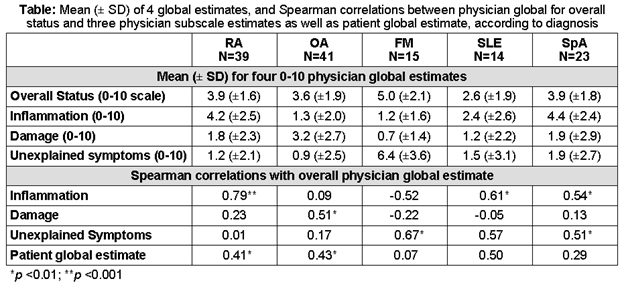Session Information
Session Type: Abstract Submissions (ACR)
Background/Purpose: A physician global estimate (DOCGL) is important in clinical decisions concerning patients with rheumatoid arthritis (RA), and often is the most efficient of the 7 RA Core Data Set measures to distinguish active from control treatments in RA clinical trials. DOCGL is designed to assess inflammatory activity, but may be influenced by organ damage and “unexplained” chronic pain syndromes. Therefore, 3 subscale DOCGL visual analog scales (VAS) have been developed to estimate level of a) inflammation, b) damage, and c) “unexplained symptoms,” in addition to overall status, reflecting the expertise of the rheumatologist concerning whether patient symptoms result primarily from one of these 3 bases. We analyzed the 4 DOCGL estimates for inflammation, damage, “unexplained” and overall status in consecutive patients with 5 rheumatic diagnoses: RA, osteoarthritis (OA), fibromyalgia (FM), systemic lupus erythematosus (SLE), and spondyloarthropathy (SpA).
Methods: The study was conducted in the private practice of one rheumatologist. All consecutive patients, regardless of diagnosis, complete a patient questionnaire, and are assigned four DOCGL estimates: overall status, inflammation, damage to any organ (e.g., joint, kidney) and “unexplained symptoms.” Overall DOCGL was scored 0-10; the other 3 scales were scored 0-3 and recoded to 0-10, the current practice. Physician estimates at first visit of consecutive patients for the 4 DOCGL scales were analyzed in 5 diagnostic categories: RA (n=39), OA (n=41), FM (n=15), SLE (n=14) and SpA (n=23). Mean (standard deviation) and Spearman correlations were computed for overall physician global estimate with subscale estimates for inflammation, damage and “unexplained,” as well as patient global estimate of status.
Results: DOCGL for overall status ranged from 2.6 to 5.0, highest for patients with FM (5.0), followed by RA (3.9), SpA (3.9), OA (3.6), and SLE (2.6). Physician subscale estimates were higher for inflammation than for damage or “unexplained” in RA, SLE, and SpA; higher for damage than for inflammation or “unexplained” in OA; and higher for “unexplained” than for inflammation or damage in FM (Table). Highest correlations of overall DOCGL were seen with physician subscale estimates for inflammation in RA, SLE, and SpA; with damage in OA; and with “unexplained” in FM.
Conclusion: Physician estimates for inflammation, damage and “unexplained symptoms” differ in patients with different rheumatic diagnoses. These 3 subscales reflect the expertise of the rheumatologist to estimate the basis for patient symptoms, and supplement the overall physician global estimate as a quantitative summary of the physical examination to assess and monitor patients with all rheumatic diseases in usual care.
Disclosure:
I. Castrejón,
None;
M. J. Bergman,
None;
T. Pincus,
None.
« Back to 2012 ACR/ARHP Annual Meeting
ACR Meeting Abstracts - https://acrabstracts.org/abstract/four-physician-global-assessments-for-overall-status-inflammation-damage-and-unexplained-symptoms-are-useful-in-usual-care-of-patients-with-osteoarthritis-fibromyalgia-systemic-lupus-erythematosu/

